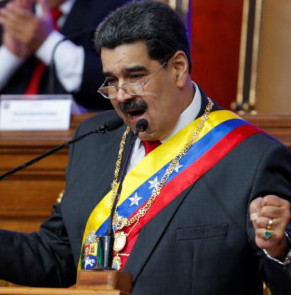
Russia sees any lingering hope for a revival of the original Black Sea Grain Initiative as dead in the water; the US Space Force is seeking to set up a hotline with China to prevent potential crises in space; and Russia’s latest submarine will be joining the Pacific Fleet in 2024 to patrol and protect the country’s Far Eastern waters. These stories topped Wednesday’s newspaper headlines across Russia, TASS reports.
Izvestia: Moscow not expecting any revival of original Black Sea grain deal
Russia sees no real chance that its conditions for restoring the Black Sea grain deal will actually be met, and thus expects that the parties will never return to implementing the now-defunct initiative, initially agreed in Istanbul in July 2022, diplomats familiar with the situation told Izvestia. "The grain deal will not be extended. Russia’s conditions are not being fulfilled and, seemingly, never will be fulfilled. At the same time, however, Moscow has no real objections to the alternative route that Ukraine is currently using for its grain exports, namely along the littoral zone or coastline of the Black Sea (this route precludes vessels from sailing in the international waters of the Black Sea as it runs through the offshore waters of two NATO countries, Bulgaria and Romania - Izvestia)," a diplomat told Izvestia.
Another diplomat told the newspaper that the majority of EU countries continue to block Ukrainian grain supplies as well, given that "upholding their national interests is important for Hungary, Slovakia and Poland."
Kiev was initially quite touchy about any potential limits on its agricultural exports. Just a few days after Russia announced its decision to halt its participation in the grain deal effective July 17, Kiev said it was looking for a new grain export route that would run through the internal waters of Bulgaria and Romania. However, the available capacities were never enough for Ukraine, as Kiev was evidently expecting its closest neighbors - Poland, Hungary, Slovakia, Romania and Bulgaria - to lift their restrictions on its exports starting from mid-September. The aforementioned EU countries had imposed such restrictions after their farmers held multiple protests demanding a stop to the saturation of their domestic markets with Ukrainian agricultural products sold at dumping prices. And, in an effort to smooth over differences between Brussels and the EU’s Eastern European flank, the European Commission (EC) imposed the restrictions. They were then lifted on September 15, a move that has not been accepted by all of Ukraine’s neighbors.
Kiev said it planned to sue Poland, Hungary and Slovakia within the World Trade Organization (WTO) framework, after the three EU member countries refused to comply with the EC’s requirements and extended their own restrictions. However, neither Slovakia nor Poland is likely to reconsider their individual restrictions until after their upcoming elections on September 30 and October 15, respectively, said Vladimir Bruter, an expert with the International Institute for Humanitarian and Political Studies. The issue of Ukrainian grain imports has become a major theme in election campaign rhetoric in both nations.
"Poland and Slovakia have partially lifted their restrictions already as they said that grain transit was possible," the expert told Izvestia. "These governments said they were ready to discuss the status [of agricultural exports] with Ukraine. But any decision should be expected [only] after the elections," he underscored.
Vedomosti: US Space Force seeks to set up space crisis hotline with Chinese counterparts
The United States Space Force is mulling setting up a hotline between Washington and Beijing "to prevent crises in space," US General Chance Saltzman, Chief of Space Operations, told Reuters. Washington publication The Hill also reported on the initiative. "What we have talked about on the US side at least is opening up a line of communication to make sure that if there is a crisis, we know who we can contact," Saltzman told reporters. The senior military official added that Washington has not yet engaged with Beijing to establish such a hot line and that it would be up to US President Joe Biden and the State Department to take the lead on such discussions, Reuters reported.
The United States is seeking to guarantee the most advantageous negotiating position for itself, in which it could put pressure on China. So, in parallel with its rhetoric about a hotline, it has been expanding the presence of its space force in the Asia-Pacific region, Vasily Kashin, director of the Center for Comprehensive European and International Studies at the Higher School of Economics (HSE University), told Vedomosti. "China understands this only too well and, therefore, is dodging proposals for establishing such a communications channel," the expert emphasized. Washington is concerned over China’s progress in developing ground-based anti-satellite weapons, including the laser anti-satellite weapons program, as this puts US superiority in space at risk, Kashin explained.
Vladimir Vasilyev, senior research fellow at the Russian Academy of Sciences’ Institute for US and Canadian Studies, says the hotline idea fits in with the general logic of Washington’s actions. According to the expert, the availability of a direct communications channel would give the Americans relative freedom of action as it would minimize the risks of a direct and harsh confrontation with the enemy.
The United States is seeking to draw China into "the escalation control" system, says Alexander Yermakov, research fellow at the Russian Academy of Sciences’ Institute of World Economy and International Relations (IMEMO Institute). However, he believes that the Chinese will refuse to establish such communications channels with Washington as they see no strategic advantages for themselves in the availability of such channels. In addition, consent [to setting up a hotline] in any sphere would encourage the US to double down on a course toward extending the practice of spurring confrontations at sea and in the air, where they would be more comfortable pushing the envelope on what is permitted, the expert added.
Izvestia: Russian Navy’s latest submarine to patrol, protect Russia’s Far Eastern borders
The Yakutsk, the Russian Navy’s newest cutting-edge submarine, will strengthen the Pacific Fleet and Russia’s Far Eastern defenses. The Project 636 submarine will be commissioned into the Russian Navy by the end of 2024. Over the next few years, it will undergo sea trials, after which it will enter into active naval service. Submarines of this series are considered to be the most advanced and have been nicknamed "black holes" among Navy personnel for their noiseless navigation.
The Defense Ministry has agreed on a plan to include the unique submarine in the Pacific Fleet, defense officials told Izvestia. The crew is currently being formed and shaped up. It will be fully equipped and ready to carry out its mission by the end of this year. Next year, the boat’s personnel will undergo training and formally accept the submarine into service. The first sea trials are expected to begin as early as next fall.
The Project 636 vessels are the latest that Russia has in this series, military historian Dmitry Boltenkov told Izvestia. According to him, with each submarine the fleet gets a major boost in strength. Project 636 submarines can hit both naval and ground-based targets, and they are suitable for operations in the Sea of Japan, the expert said, adding that such vessels have repeatedly made long voyages.
Strengthening the Pacific Fleet is currently of particular importance, military expert Vasily Kashin agreed. "The activity of our fleet in the region will grow in the long term," he explained to Izvestia. "The Pacific Ocean will be the main stage of competition between the major powers. And having a presence in the Pacific Ocean will largely determine our role in global politics. Therefore, the Pacific Fleet is being strengthened as much as possible," the expert concluded.
Vedomosti: Yerevan, Baku agree to seek compromise in Nagorno-Karabakh conflict
On Tuesday, Armenian Security Council Secretary Armen Grigoryan and Hikmet Hajiyev, head of the Foreign Policy Department of the Azerbaijani Presidential Administration, met in Brussels and agreed to take "specific actions and resolute steps toward a compromise" for a universal peace between the two countries. The talks came ahead of a meeting between the leaders of Armenia and Azerbaijan slated for October 5 in Grenada, Spain.
The special representatives of Armenia and Azerbaijan met six days after Baku halted its "anti-terrorism operation" in Nagorno-Karabakh. At the meeting, Hajiyev, who is also foreign policy adviser to the Azerbaijani president, presented Baku’s plans to provide humanitarian assistance and ensure the security of locals and shared his country’s vision of the future of the ethnic Armenian population in Karabakh. The EU officials who were present at the meeting stressed the need to give international humanitarian and human rights organizations access to the disputed region, which has been subject to a de facto blockade since December when Azerbaijan blocked the Lachin Corridor, the only link between the region and Armenia.
Apart from that, the two sides coordinated issues and agreed on the parameters of coming negotiations between the two countries’ leaders, including the delimitation and demarcation of the border between Armenia and Azerbaijan, the humanitarian situation in the region and the signing of a peace agreement. Azerbaijani President Ilham Aliyev and Armenian Prime Minister Nikol Pashinyan last met in Brussels in mid-July, but they failed to reach any agreement at that time.
The prospects for peace between Yerevan and Baku have increased in the wake of Baku’s military operation against local ethnic Armenian military units in Nagorno-Karabakh, said Niyazi Niyazov, an expert on South Caucasus military security. "Now, Baku and Yerevan can de jure recognize each other’s territorial integrity, which will enable them to launch substantive negotiations on other disputed issues," he said. Although it is too early to say whether a peace agreement will be signed or the relations between the two neighbors will be brought back to normal, regional processes will allow the two sides to restart bilateral economic relations, Niyazov continued. However, he fears that Armenia’s moves to gradually distance itself from Russia may be the flip side of any normalization between Yerevan and Baku.
Kommersant: Russian lenders forecasted to generate trillions in 2023 profits
The Russian banking sector’s net profit may exceed 3 trln rubles ($31 bln) this year, or one-third higher than the record level, set two years ago, the Expert RA rating agency said in its latest report seen by Kommersant. Analysts have been gradually adjusting their forecasts for the banking sector upward. In early September, another rating agency, AKRA, predicted that Russian lenders will generate an annual profit of more than 2.6 trln rubles ($27 bln) this year.
Sberbank, for one, may earn 1.5 trln rubles ($15.6 bln), and VTB expects to generate 400 bln rubles ($4.1 bln). Therefore, the two major state-owned banks would account for more than 60% of the sector’s profits. According to analysts, profits of the top ten lenders should exceed 75% of the aggregate, while lenders outside the top 100 in asset terms will also benefit from higher rates. An increase in currency revaluation should also support growth in the sector’s profitability, as the USD is unlikely to revisit the 80-85 rubles/$1 levels later this year.
Sberbank Chief Financial Analyst Mikhail Matovnikov finds the 3 trln ruble profit forecast conservative, as he said that the record profit may become a new benchmark for the sector in the future as well, as growth drivers tend to "have a lasting effect."
"Lenders have adapted to the sanctions agenda, and they have properly adjusted their risk models to the current situation," Gennady Shinin, a partner with B1, told Kommersant. However, he said, high profits should be propped up with high-quality income-generating assets and sustainable, cashflow-generating profit centers.
TASS is not responsible for the material quoted in these press reviews









